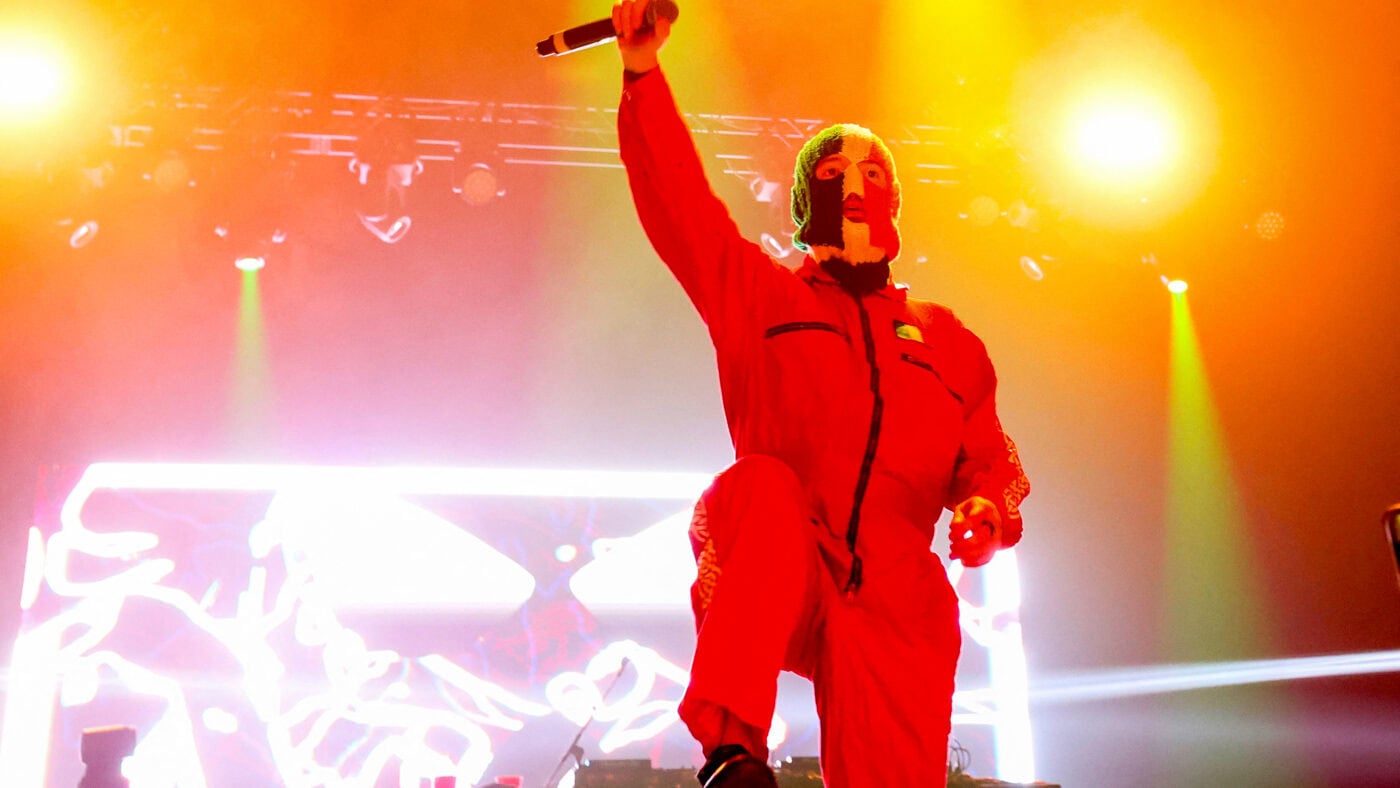A couple of weeks ago, when footage emerged of Belfast rap group Kneecap calling for the deaths of Tory MPs and appearing to endorse Hamas and Hezbollah, I gave my opinion on this site. It was not wholly positive.
Kneecap is composed of perhaps the three most obnoxious men in modern popular culture. In a nod to republican paramilitaries, one regularly dons a tricolour balaclava; while the other two have mastered the smug, reflexive sectarianism that plays well among the part-time DJs and house-party bores who tune in to PoliticsJoe.
My main gripe, however, was that the band received taxpayer funding to promote their music. Britain is an expensive place to live in at the moment, and the thought of UK taxpayers having to fork out for artists whose USP is hating the Union makes the blood boil.
It seems to me that this is an uncontroversial view to hold, particularly as a right-winger. Yet the latest instalment in the Kneecap saga has exposed a hole in the thinking of many on the Right.
This week, band member Liam Og O Hannaidh was charged by the Met under the Terrorism Act for the piece of footage that appeared to show him waving a Hezbollah flag at a gig in November 2024 at the O2 Forum in Kentish Town. Remarkably, he wasn’t charged for the incitement to kill Tory MPs.
Among the online Right, the spectacle was met largely with jubilation. ‘Huzzah! Britain’s useless cops have taken a break from dancing at Notting Hill Carnival to actually enforce the law.’ But this might not be the good news they thought it was.
My favourite German, the IEA’s Kristian Niemietz, had this to say in the aftermath:
This is bad. Kneecap are a bunch of daft, trendy Corbynista-commie kids who are trying too hard to be edgy. But they should have every right to be just that. They should be ridiculed, not prosecuted.
The comments are telling. ‘Let me guess you think Lucy Connolly should have served her full sentence,’ cried one anon. ‘OK right but I presume you agree someone should be in prison for a tweet?’, asked another. For context, Lucy Connolly is the woman who was slapped with a 31-month prison term for a post on the day of the Southport killings in which she encouraged followers to ‘set fire’ to asylum hotels and called for ‘mass deportation now’. The Court of Appeal upheld her sentence this week.
The cognitive dissonance on display in the comments under Niemietz’s post reflects what has come to define debates around free speech. Rather than going out to bat for Kneecap over Connolly, the point Niemietz is making is that if free speech is to be heralded as a fundamental right, it must apply to all Britons equally, regardless of whether you agree with them. If you find the Lucy Connolly case to be an egregious miscarriage of justice, then your logic should lead you to feel the same about Kneecap.
Alternatively, you can just swallow your hypocrisy and enjoy the dopamine of the echo chamber. This is the more popular approach.
While tempting, the risk of adopting this attitude is that it endorses exactly the kind of ‘two-tier’ law enforcement that so many on the Right like to rail against. Politicians, like all other professionals, respond to market incentives. If the incentives provided to them by their respective supporters on social media encourage them to prioritise the rights of one group or transient trend over another, that will be reflected in parliamentary debate and confuse the dispensation of justice.
We saw this play out during the Covid pandemic, when many were furious at the contrast between the ‘soft’ policing of Black Lives Matter protests and the robust action taken against predominantly right-wing counter-demonstrators. People might also feel pretty irked when, after watching the police explain to people that swastikas on display at pro-Palestine marches need to be ‘taken in context’, they discover that the officers who searched Julian Foulkes’ home following his arrest for an online comment in 2023, remarked that his reading material was ‘a bit Brexity’.
These examples are but a few of the absurdities that have made headlines in recent years. At the moment, they seem to disproportionately impact those who exist on various points of the right-wing spectrum. For right-wingers, this is obviously disconcerting, but holding an entirely self-regarding view of free expression is not going to help them. If they want their rights protected or supposed injustices addressed, they should start to think of free speech as a universal principle, rather than just applying to those they agree with. Politicians will be forced to take note of this; and if more of them on the Right begin to defend violations of free speech regardless of political leaning, the Left, if they have any decency, might well do the same.
I find Kneecap as intolerable as the next man, and I’d be lying if I said that I didn’t briefly share in the schadenfreude of their comeuppance. However, I bet that the next person to find themselves arrested and sentenced for a comment made in anger will be sharpening their toothbrush in prison wishing they’d listened to the likes of Kristian Niemietz.
Click here to subscribe to our daily briefing – the best pieces from CapX and across the web.
CapX depends on the generosity of its readers. If you value what we do, please consider making a donation.


